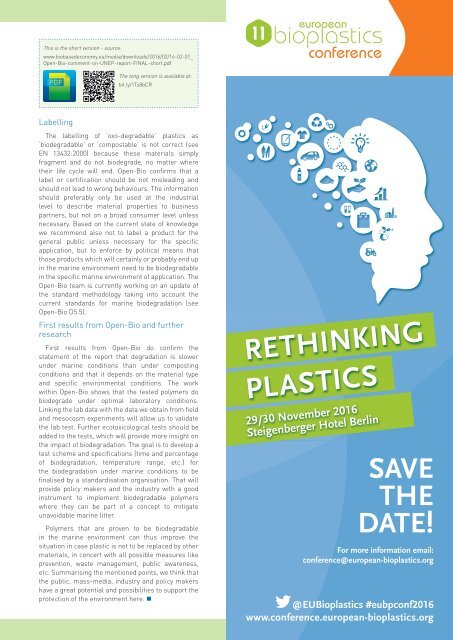Issue 02/2016
bioplasticsMAGAZINE_1602
bioplasticsMAGAZINE_1602
You also want an ePaper? Increase the reach of your titles
YUMPU automatically turns print PDFs into web optimized ePapers that Google loves.
This is the short version - source:<br />
www.biobasedeconomy.eu/media/downloads/<strong>2016</strong>/<strong>02</strong>/16-<strong>02</strong>-01_<br />
Open-Bio-comment-on-UNEP-report-FINAL-short.pdf<br />
The long version is available at:<br />
bit.ly/1Ts8bCR<br />
Labelling<br />
The labelling of ‘oxo- degradable’ plastics as<br />
‘biodegradable’ or ‘compostable’ is not correct (see<br />
EN 13432:2000) because these materials simply<br />
fragment and do not biodegrade, no matter where<br />
their life cycle will end. Open- Bio confirms that a<br />
label or certification should be not misleading and<br />
should not lead to wrong behaviours. The information<br />
should preferably only be used at the industrial<br />
level to describe material properties to business<br />
partners, but not on a broad consumer level unless<br />
necessary. Based on the current state of knowledge<br />
we recommend also not to label a product for the<br />
general public unless necessary for the specific<br />
application, but to enforce by political means that<br />
those products which will certainly or probably end up<br />
in the marine environment need to be biodegradable<br />
in the specific marine environment of application. The<br />
Open- Bio team is currently working on an update of<br />
the standard methodology taking into account the<br />
current standards for marine biodegradation (see<br />
Open- Bio D5.5).<br />
First results from Open- Bio and further<br />
research<br />
First results from Open- Bio do confirm the<br />
statement of the report that degradation is slower<br />
under marine conditions than under composting<br />
conditions and that it depends on the material type<br />
and specific environmental conditions. The work<br />
within Open- Bio shows that the tested polymers do<br />
biodegrade under optimal laboratory conditions.<br />
Linking the lab data with the data we obtain from field<br />
and mesocosm experiments will allow us to validate<br />
the lab test. Further ecotoxicological tests should be<br />
added to the tests, which will provide more insight on<br />
the impact of biodegradation. The goal is to develop a<br />
test scheme and specifications (time and percentage<br />
of biodegradation, temperature range, etc.) for<br />
the biodegradation under marine conditions to be<br />
finalised by a standardisation organisation. That will<br />
provide policy makers and the industry with a good<br />
instrument to implement biodegradable polymers<br />
where they can be part of a concept to mitigate<br />
unavoidable marine litter.<br />
Polymers that are proven to be biodegradable<br />
in the marine environment can thus improve the<br />
situation in case plastic is not to be replaced by other<br />
materials, in concert with all possible measures like<br />
prevention, waste management, public awareness,<br />
etc. Summarising the mentioned points, we think that<br />
the public, mass- media, industry and policy makers<br />
have a great potential and possibilities to support the<br />
protection of the environment here. •<br />
RETHINKING<br />
PLASTICS<br />
29/30 November <strong>2016</strong><br />
Steigenberger Hotel Berlin<br />
SAVE<br />
THE<br />
DATE!<br />
For more information email:<br />
conference@european-bioplastics.org<br />
@EUBioplastics #eubpconf<strong>2016</strong><br />
www.conference.european-bioplastics.org<br />
bioplastics MAGAZINE [<strong>02</strong>/16] Vol. 11 27


















